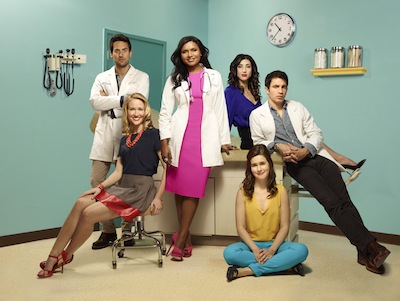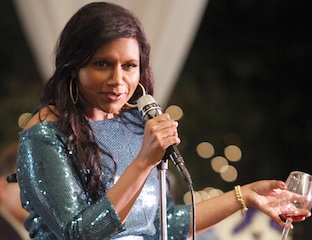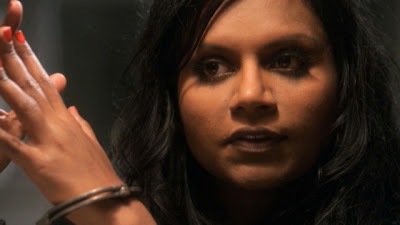 |
| ‘The Mindy Project’ premiers Sept. 25 (the pilot is available on Hulu). |
The anti-hero is in. While one could analyze at length what this says about our society, it’s clear that we are more smitten with the male anti-hero than the female one. There’s still a notion that our female protagonists–when we get them–need to be flawed, but not too much. We still want them to fit a mold of what we deem good.
Mindy Kaling’s new sitcom, The Mindy Project, gives us the rare fully flawed female anti-hero in a prime-time comedy. What’s striking in the pilot episode (Hulu is previewing the pilot before the show premiers on Fox on Sept. 25), is that Mindy’s character, Mindy Lahiri, an OB/GYN, isn’t particularly lovable. In fact, she’s kind of an asshole.
And it’s great.
Lahiri gets trashed and attempts to ruin her ex’s wedding. She loves romantic comedies in a completely shallow, selfish way. She makes inappropriate (even racist) jokes. Was I being seduced by the fact that M.I.A. was blasting in the background during the show’s climax? Why did all of this work so well for me?
 |
| Lahiri, at her ex’s wedding, drunkenly insults the couple (including jabs at his new wife’s ethnicity). |
I realized that it felt good to see an unlikable female protagonist. It felt good to see a true female anti-hero. Of course, it’s clear that we are supposed to root for her, and can do so easily. Lahiri as a protagonist fits in more with Sterling Archer, Michael Scott, Larry David and Jeff Winger than she would with Leslie Knope and Liz Lemon. We accept men as lovable assholes, but for women it’s often a different story.
The expectations we have for female characters in entertainment rival the expectations we have for women in our culture. Be funny, but not crude. Be pretty, but not vain. Be confident, but not prideful. Be excellent at your career, but don’t sacrifice love and motherhood. Be sexy, but not sexual.
Our expectations for men are much simpler, and less impossible. In fact, the expectations could be characterized as “lack thereof” (this is problematic in its own way). Perhaps this is the reason why we embrace the male anti-hero (whether it’s a sitcom, hour-long drama, film or Ernest Hemingway novel). Audiences expect men to be crude, shallow and unpleasant on many levels. These low expectations open up countless opportunities for complex male characters.
 |
| “I’m sorry, disorderly conduct? Aren’t there rapists and murderers out there?” Upon release from her arrest, Lahiri shows little remorse. |
Don’t get me wrong, I love Knope and Lemon. Knope’s character–the entire show, really–is a shining example of feminism in practice. Lemon is flawed, but is also hyper-self-aware and apologetic for herself in many ways. Both of those characters want to be liked. Lahiri (a true model Millennial) doesn’t seem like someone who would apologize to anyone. She just wants it all.
I look forward to having a relationship with a female anti-hero like I have with so many male anti-heroes on TV. I look forward to laughing and/or cringing at some of the character’s words and actions. Lahiri is not what we’ve been taught is the ideal. She’s real, and says and does things that don’t “fit” the ideal mold. Of course it goes without saying that seeing a curvy woman of color in a leading role feels pretty amazing.
We don’t need every female protagonist to be a true hero. We simply need more complex depictions of women–the good, the bad and the accurate. We shouldn’t expect our female protagonists to keep sweet any more than we should ourselves.
A reviewer at The Atlantic Wire, in a disappointed review of the pilot, says of the show’s premise, “… I’m worried this particular setup might not be the one. Bawdy talk in an OB/GYN office followed by drunken antics in a mini dress is all well and good, I guess. But Kaling, to some of us at least, has always seemed a bit better.”What does this mean, exactly, besides A. the show is too feminine, and B. she should be “better” than bawdiness and drunkenness? That’s not the point and is the whole point, all at once.
Lahiri grew up in an era of idealized depictions of love and womanhood via Meg Ryan and Sandra Bullock rom-coms. She wants that happy ending, but doesn’t seem to want to change herself for it. She’s clearly excellent at her career. At the end of the day–and at the end of the episode–she just wants to get laid. So she does.
She smiles toward the camera and we’re invited not to judge, and not to clutch our pearls and wish for a more perfect female character. We’re simply supposed to come along for the ride.
—
Leigh Kolb is a composition, literature and journalism instructor at a community college in rural Missouri.

I’d put Patty Hewes from Damages and Nurse Jackie into same boat. Wonderfully complex and flawed characters that I absolutely adore!
@Madge — Yes, yes, a thousand times YES!! I freaking LOVE Patty Hewes and I’m kind of obsessed with her. Just finished watching Damages seasons 1-3…some of the best TV I’ve watched ever. What I love about Patty is that she’s brilliant, ruthless, ferocious, fearless, confident, with a Machiavellian moral code and a loathing for bullies. Can’t. Get. Enough.
This post is great! I completely agree. I don’t think this show would work as well as it does for me if she was sweeter and more lovable. I like Mindy Lahiri the way she is and I can’t wait to see more of her misadventures. I’m planning to set my Hopper to record The Mindy Project for me, since I work late nights at Dish. It’s a relief to know I won’t have to miss a single episode, especially since I can already tell this will be a show I’ll be spending my whole week looking forward to.
Really enjoyed this post. And I completely agree! I’ve been putting off starting this series but after reading this I’m going to watch the first episode ASAP! (Short little segue, apologize in advance) what you said reminded me of reviews that I’ve read of Gillian Flynn’s works. In short, a reviewer posited that Gillian Flynn is anti-feminist because her female characters are, for lack of better word(s), sociopathic, manipulative, self-deprecating and sometimes all around evil. Another review said (to which I agree) that that is what makes Flynn’s work feminist in the first place. We are given female characters that, yes, are deplorable, but the men portrayed are just as bad. In no way are they disparaging one sex or the other, instead they’re showing us the reality of the diversity among people. Hearing that television is starting to give us female characters that can be snide jerks but still lovable (most of the time, I love Archer but a lot of the time I just wanna slap that jerk) goes to show the steps that media is taking in wanting to give us more realistic portrayals of people.